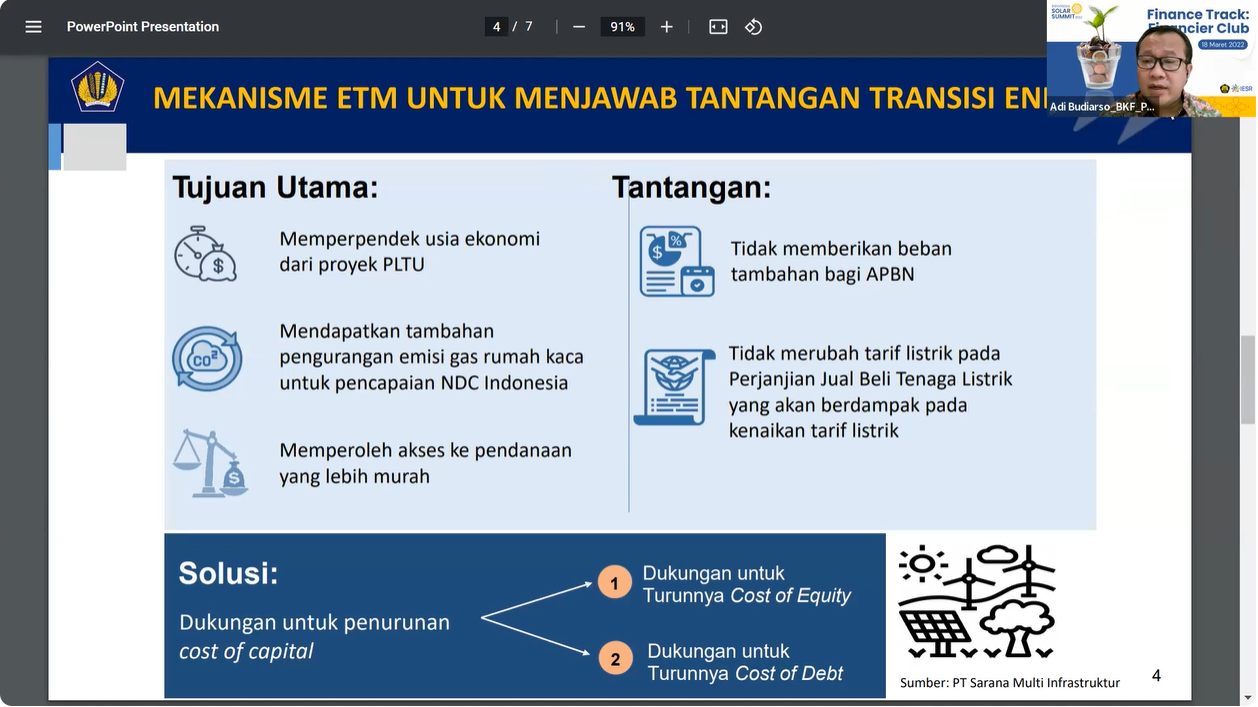Jakarta, 18 March 2022– The financing of energy transition in Indonesia, especially in the Solar PV Power Plant, needs to be mobilized immediately. The technical potential of solar energy in Indonesia is enormous. Based on a study from the Institute for Essential Services Reform (IESR), the potential of solar energy in Indonesia is up to 20,000 GWp waiting to be harvested so that it can achieve a carbon-neutral target in 2060 or sooner, according to the government’s commitment. Financial institutions can capture various Solar PV Power Plant financing opportunities by identifying investments and risks. Identification of investments and stakes in Solar PV Power Plant financing, the obstacles financial institutions face in providing Solar PV Power Plant financing schemes, and innovative financing practices are discussed in the Financier’s Club: Financing Solar Energy in Indonesia. This activity was held in collaboration with the Ministry of Energy and Mineral Resources with IESR as a pre-event for the Indonesia Solar Summit (ISS) held in Jakarta.
Opening the discussion, Sahid Djunaidi, Secretary-General of the Directorate General of Renewable Energy and Energy Conservation (DG EBTKE), emphasized that the emission reduction target can only be achieved if the country makes an energy transition as a fundamental step. The vast potential and short construction period make solar energy a mainstay in providing renewable energy in Indonesia. Several banks have provided financing schemes for rooftop solar power plants, but financing innovation is still needed to encourage more massive rooftop solar power plants. Currently, the Ministry of Energy and Mineral Resources (MEMR), in collaboration with UNDP, is conducting an incentive grant program for rooftop solar PV to support the development of rooftop solar PV in Indonesia.
“The challenge in developing solar power plants is in the financial sector because of the high risk, not many markets, and the lack of financing guarantees,” he said.
Coordination in policymaking and cooperation between parties is essential to achieving sustainable finance and climate targets. This was stated by Agus Edy Siregar, Deputy Commissioner for Financial System Stability of the Financial Services Authority (OJK).
“The climate change mitigation agenda requires large funds and cannot be met only from the state budget, but also requires financing from the financial sector,” he added.
Edy said that OJK had compiled several documents on investment in several sustainable sectors, including a green taxonomy, carbon market preparation, and banking reporting related to the financed sector. It is hoped that there will be incentives and disincentive mechanisms in the finance and financing sector.
In addition, Enrico Hariantoro, Head of the OJK Integrated Financial Services Sector Policy Group, said that OJK has been supporting banking instrumentation for a long time to support sustainability financing (POJK 51/2017 POJK 60/2017). According to him, there are several risk aspects that banks are very concerned about, including technical understanding, how to guard the ecosystem, and the payback period. Furthermore, he argues that financing schemes for Solar PV Power Plant could be more varied and innovative, for example, combining elements from facilities, philanthropy, technical, and becoming one with KPR so that it is included in customers’ comfort level bankability of financial providers. OJK always encourages the acceleration of Solar PV Power Plant financing through regulation, of course, by considering the feasibility study (FS).
On the other hand, Adi Budiarso, Head of the Financial Sector Policy Center (PKSK) Fiscal Policy Agency (BKF), said that there is an Energy Transition Mechanism (ETM) to answer the challenges of the energy transition with the primary goal of shortening the economic life of the PLTU Clean Energy Facility (CEF), get additional greenhouse gas emission reductions by building a renewable energy Carbon Recycling Fund (CRF) to achieve Nationally Determined Contribution (NDC), and gain access to cheaper funding.
BKF has implemented tax incentives for investments such as tax holidays, tax allowances, PPh DTP, VAT exemptions, import duty exemptions, tax and customs facilities, and exemptions from collecting PPh 22. According to Adi, the Indonesian financial system is ready to implement sustainable finance, supported by green taxonomy. In addition, BKF has conducted mapping with nine universities, associations, and stakeholders. Adi said that Regional Banks had the opportunity to help accelerate the Solar PV Power Plant development. Renewable energy has the potential to create electricity supply independently. The existence of BPR, the regional company, can be one of the doors for the entry of Solar PV Power Plant financing.
Edwin Syahruzad, President Director of PT Sarana Multi Infrastruktur (SMI), who was present on the same occasion, informed the participants that PT SMI has taken strategic steps in financing Solar PV Power Plant. In addition, PT SMI has provided financing for all types of renewable energy, such as hydroelectric power, geothermal power plants, wind power plants, solar PV power plant, and biomass. However, he said that PT SMI’s commitment to the Solar PV Power Plant project depends on the pipeline project.
“The Solar PV Power Plant pipeline is more derived from rooftop Solar PV, and I think this is a potential that must be worked on. However, the approach is slightly different from on-grid Solar PV Power Plants because rooftop Solar PV comes from contracts with building owners where Solar PV Power Plants are installed. The building owners can come from outside of the electricity sector. The revenue model is also quite different. It is the domain of banks with building owner customers who can expand their business opportunities using rooftop solar PV,” said Edwin.

